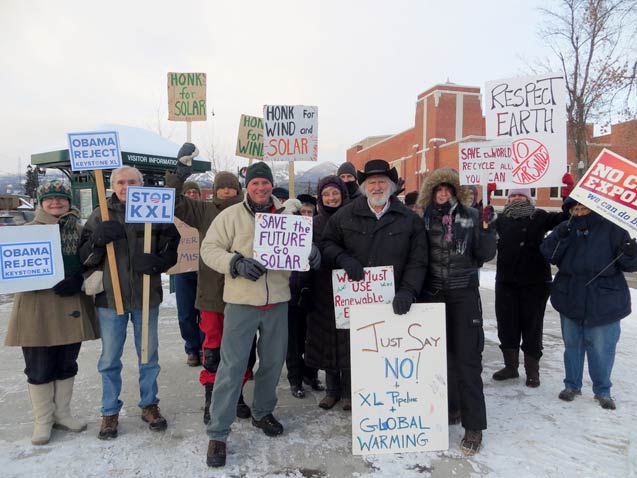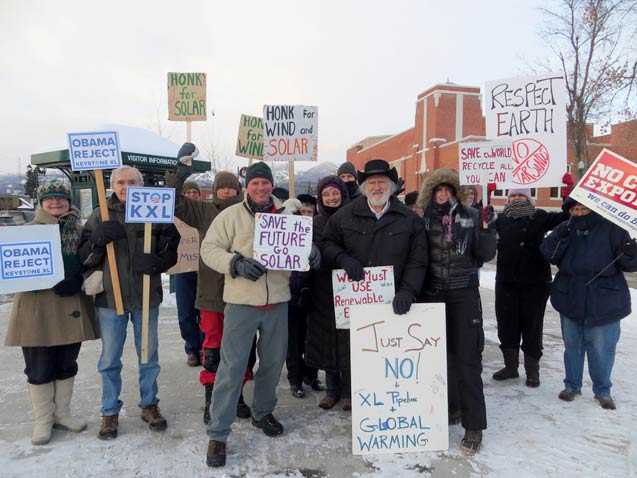
 Opponents of the Keystone XL pipeline rally in Whitefish, Mont., earlier this month. (Photo: 350.org / Flickr)
Opponents of the Keystone XL pipeline rally in Whitefish, Mont., earlier this month. (Photo: 350.org / Flickr)
Local landowners and environmentalists who have long opposed the pipeline project are celebrating the decision.
The Keystone XL pipeline project suffered a major setback this week with a Nebraska court ruling that will likely delay any final decision on the pipeline for at least another six months.
The District Court judge ruled in favor of three landowners—Randy Thompson, Susan Luebbe, and Susan Dunavan—who challenged a Nebraska law granting Gov. Dave Heineman and state environmental regulators special authority to approve pipeline projects. The governor used this new authority to approve Keystone XL’s passage through the state, despite opposition from landowner and environmental groups.
President Obama had been expected to make a decision on the pipeline at some point this summer or later. Now, the already contentious process is on hold. If the pipeline is again approved in Nebraska, it will likely go through a lengthy rerouting process before going back to the president for a final decision.
Dave Domina, the attorney who represented the landowners, said in a news release that the pipeline company TransCanada now “has no approved route in Nebraska. TransCanada is not authorized to condemn the property against Nebraska landowners. The pipeline project is at standstill in this state.”
TransCanada’s spokesperson, Shawn Howard, told Bloomberg news in an email that “we are disappointed and disagree with the decision,” and are deciding what steps to take next.
Jane Kleeb of Bold Nebraska, a citizen advocacy group, was encouraged by the ruling. “This clearly gives a boost to landowners and citizens,” she said, groups that had worked to challenge what she called the governor’s “illegal process.”
The Keystone XL pipeline, which would transport tar sands crude from Alberta to refineries in east Texas, has already been delayed by at least two years—due to legal challenges like this one, but also by a grassroots environmental campaign on a scale not seen since the anti-nuclear protests of the 1970s. Some landowners were particularly vocal in their opposition, noting that tar sands are more likely to spill than regular crude oil and thus pose a greater threat to land and water.
Kleeb hopes that landowners and citizens in other states along the Keystone XL route will take courage from the ruling. “If we stick together, and if we show that we can outlast all other lobbying and PR campaigns, then it is possible to win.”
Thank you for reading Truthout. Before you leave, we must appeal for your support.
Truthout is unlike most news publications; we’re nonprofit, independent, and free of corporate funding. Because of this, we can publish the boldly honest journalism you see from us – stories about and by grassroots activists, reports from the frontlines of social movements, and unapologetic critiques of the systemic forces that shape all of our lives.
Monied interests prevent other publications from confronting the worst injustices in our world. But Truthout remains a haven for transformative journalism in pursuit of justice.
We simply cannot do this without support from our readers. At this time, we’re appealing to add 50 monthly donors in the next 2 days. If you can, please make a tax-deductible one-time or monthly gift today.